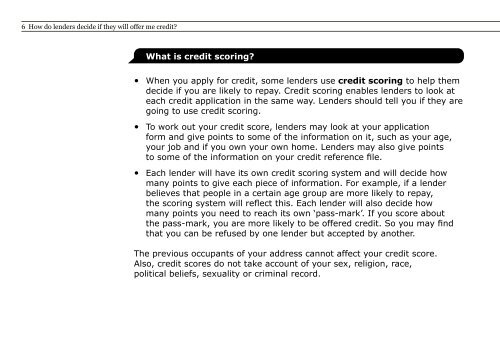credit-explained-dp-guidance
credit-explained-dp-guidance
credit-explained-dp-guidance
- No tags were found...
You also want an ePaper? Increase the reach of your titles
YUMPU automatically turns print PDFs into web optimized ePapers that Google loves.
6 How do lenders decide if they will offer me <strong>credit</strong>?How do lenders decide if they will offer me <strong>credit</strong>? 7What is <strong>credit</strong> scoring?• When you apply for <strong>credit</strong>, some lenders use <strong>credit</strong> scoring to help themdecide if you are likely to repay. Credit scoring enables lenders to look ateach <strong>credit</strong> application in the same way. Lenders should tell you if they aregoing to use <strong>credit</strong> scoring.• To work out your <strong>credit</strong> score, lenders may look at your applicationform and give points to some of the information on it, such as your age,your job and if you own your own home. Lenders may also give pointsto some of the information on your <strong>credit</strong> reference file.• Each lender will have its own <strong>credit</strong> scoring system and will decide howmany points to give each piece of information. For example, if a lenderbelieves that people in a certain age group are more likely to repay,the scoring system will reflect this. Each lender will also decide howmany points you need to reach its own ‘pass-mark’. If you score aboutthe pass-mark, you are more likely to be offered <strong>credit</strong>. So you may findthat you can be refused by one lender but accepted by another.The previous occupants of your address cannot affect your <strong>credit</strong> score.Also, <strong>credit</strong> scores do not take account of your sex, religion, race,political beliefs, sexuality or criminal record.Refused <strong>credit</strong>?• If a lender uses <strong>credit</strong> scoring and you are refused <strong>credit</strong>, you can ask thelender to explain the main reason why. There could be a variety of reasonswhy the application was declined, for example, there may be informationon your <strong>credit</strong> reference file that the lender thinks is negative. Or perhapsyou did not reach the lender’s pass-mark. Lenders may also try to makesure they do not offer <strong>credit</strong> to people who may not be able to afford it.So even if you repay your existing <strong>credit</strong> accounts on time, a lender maynot want to overburden you with more. You should be aware that lendersdo not have to give you details of how their <strong>credit</strong> scoring works.• If a lender refuses you <strong>credit</strong> because it worked out your <strong>credit</strong> score justby using a computer, you can ask it to review the decision.• If a lender did not just use a computer to work out your <strong>credit</strong> score andyou have other relevant information that you think will alter the decision,you can ask the lender to review it.• When asking the lender to review the decision the lender may ask forevidence to support your appeal.• Even if a lender reviews its decision, it may still turn you down.• Different lenders use different systems for working out your score andif you ask them, they must tell you which <strong>credit</strong> reference agency theyused to get the information about you. You can then check whether theinformation they used is right.123456




